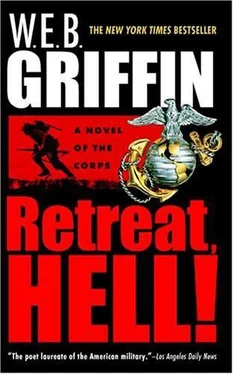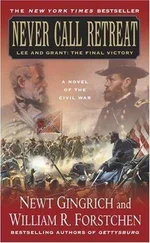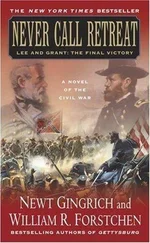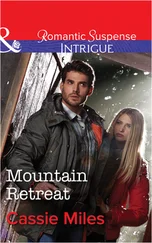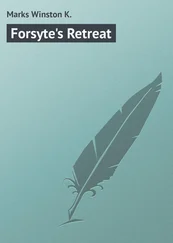"That's very kind, sir, but I fear I'm intruding."
"Not at all," Howe said. "And I was hoping for a chance to talk to you in the next day or so. My name is Howe."
He put out his hand.
"Yes, sir. I thought that's who you probably were," Dunn said.
"The old man in need of a shave and a bath is Master Sergeant Charley Rogers," Howe said. "I guess you know everybody else."
"Yes, sir, I do," Dunn said, and then rose out of his chair to offer his hand to Rogers. Zimmerman got up and went into the kitchen.
"I didn't expect to see you here, Colonel," Howe said.
"I happened to be in Seoul, sir, and I wanted to talk to Major McCoy," Dunn said.
"You 'happened to be' in Seoul?" Howe asked, smiling.
"Yes, sir, I had an early-morning mission—flying cover for a pair of enormous Army helicopters they flew off a transport into Kimpo—and I thought I'd take advantage of the opportunity."
McCoy's curiosity got the best of him.
"Enormous helicopters?" he blurted.
Dunn nodded.
"Sikorskys, I think. I saw a photo of them a while back."
"Why were you flying cover for them?" Howe asked.
"I guess they didn't want them shot down before they even got here, sir."
"How's the Army going to use them?" Howe asked. "You have any idea?"
"Not a clue, sir."
"You get my message last night, Colonel?" McCoy asked.
"I got it. One of the things I wanted to tell you was that both of the Corsairs with me—there were three of us—are going to take a lot of aerials over those coordinates you gave me—"
"Which were the coordinates for?" Howe interrupted.
"The last place we know Pick was for sure, General," McCoy said.
"—on the way back to the Badoeng Strait" Dunn finished his sentence.
Zimmerman came back into the room.
"Chow's on the way, Colonel," he announced.
"Colonel, what I wanted to talk to you about is Major Pickering," Howe said.
"Yes, sir."
"How do we get him back, Colonel?"
Lieutenant Colonel Dunn was respectful of, but not cowed by, Major General Howe.
"With respect, sir, I'm an airplane driver. The Killer and Zimmerman are the experts in that sort of thing."
Howe chuckled. "You must really be old and good friends. I understand that's the only way you can get away with calling him that."
"Yes, sir. We are. We go back a long way."
"Let me rephrase, Colonel: If you were, say, the commanding general of the 1st Marine Division, and you were ordered to return Major Pickering to U.S. control, how would you do that?"
Dunn thought his answer over a moment before speaking.
"General, just about what's happening now. Giving Major McCoy whatever—"
"Much better. Thank you, sir," McCoy said.
"Ken, I'm sorry, it just slips out," Dunn said.
"You were saying, Colonel?" Howe said.
"The best way I can think of to get Major Pickering back, sir, is just what's happening now. Giving Major McCoy whatever he thinks he needs to do it."
"Is that happening, Ken?" Howe asked. "You have everything you need?"
"Yes, sir. It is. And I can't think of anything else I need. I've even managed to borrow an infantry company—actually about two platoons—from 1st Mar-Div, in case we need them."
"The backup people for the Flying Fish Channel operation?" Howe asked.
"Yes, sir. They're at Kimpo."
"Probably wondering what the hell is going on," Zimmerman offered.
"In case you need them how, Ken?" Howe asked.
"Nothing specific, sir. But if we have to go any farther from our lines to grab Pick than we have so far, I'd rather have more people along."
"When you say you have everything you need, you mean, 'except of course for the helicopters that we don't want to take from hauling the wounded,' right?" Howe went on, looked at McCoy for a moment, and then turned to Dunn.
"Okay, Colonel," Howe said. "You say you're an airplane driver. So, for the sake of argument, let's assume you have a helicopter—hell, say four helicopters—at your disposal. How would you, as an airplane driver, use them to get Major Pickering back?"
Dunn, visibly in deep thought, did not immediately reply.
"Add this unpleasant reality to your equation, Colonel," General Howe went on. "Stop thinking of Major Pickering as a Marine pilot. Start thinking of him as someone we simply cannot afford to have fall into the enemy's hands."
Dunn met his eyes but still did not instantly reply.
Finally, he exhaled audibly.
"The one sure way to keep Major Pickering out of the enemy's hands is to locate him positively within a one-hundred-yard circle and then napalm the hell out of the circle," he said.
"Jesus Christ, Billy!" McCoy exploded.
"General, I want you to understand that I understand what's at play here," Dunn said. "Pick Pickering was my wingman at Guadalcanal. I love the bastard. But I also understand he's General Pickering's son."
"Let's hope it doesn't come to napalm," Howe said. "And let's get back to your having four helicopters at your disposal."
"Sir, with respect, I drive airplanes. Other people—in this case, that would be Major McCoy—tell me what they would like me to do with them."
"Okay," Howe said. "Okay, Ken. You have four helicopters at your disposal. How are you going to use them?"
McCoy didn't immediately reply.
"Certainly, Ken," Howe said, not unkindly, "you've thought about it."
"If we can find him, precisely locate him—which, so far, we haven't been able to do—then the standard Marine Corps procedure would almost certainly work. We arrange for fighter cover, send in one helicopter, and pick him up. I've already got that set up."
"What do you mean, you've already got it set up?" Howe asked.
"I've talked to the helicopter pilots. If we locate him, they'll go after him."
"I thought the decision has been made that helicopters will not be diverted for that purpose."
"If we can locate him," McCoy repeated, "a helicopter will be available to pick him up."
"Against orders?"
"We'll have to worry about that later."
"You took it upon yourself to order the pilots to disobey their orders?"
"I asked a couple of them, 'What if I find Pickering? Could you help?' And the answer was very simple: 'Give us thirty minutes' notice, and precise coordinates, and we'll go snatch him.' "
"So you don't need more than one helicopter?"
"I'd like to have eight, ten of them," McCoy said. "But since that's out of the question—there aren't that many—all I can use is one."
"And if you had eight or ten of them, Ken?" Dunn asked.
"I'd take that many Marines to the last marker he left. They'd drop us off and leave us. Then we'd follow his tracks. I think we could find him. If so, then we could call the helicopters back and have everybody picked up. But that's wishful thinking. Six or eight helicopters aren't available."
Howe grunted thoughtfully.
"And even if they were, General, that probably wouldn't work."
"Why not?"
"There are North Korean soldiers all over this area. And North Korean spies. Six or eight helicopters landing someplace all at once would attract a lot of attention."
"One helo taking in six or eight people one at a time?" Dunn asked.
"I thought about that, too," McCoy said. "Same answer—it would attract too much attention. And then if the NKs saw how few people there were, and went after us ..."
"You could not be evacuated," Howe said.
"No, sir," McCoy said. "Not with one helo."
"General," Master Sergeant Rogers said. Howe looked at him. Rogers tapped his wristwatch. Howe nodded, then stood up.
"Shower time," he said. "You said you have some clean fatigues for us, Bill?"
"Yes, sir, clean and starched, but I don't know what we'll do for chevrons for Charley."
Читать дальше
